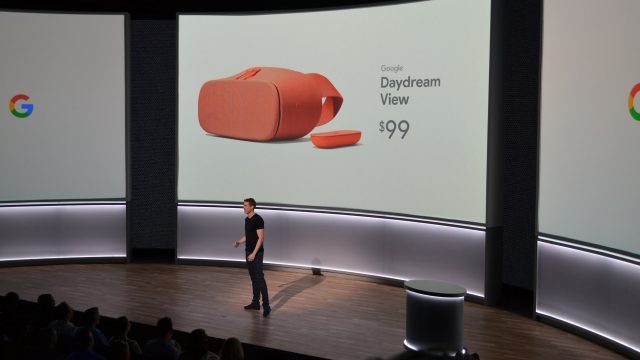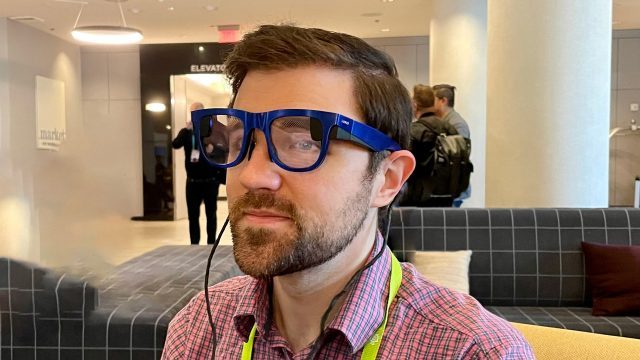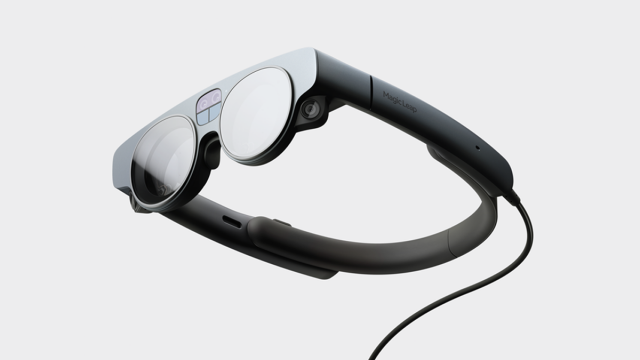Google and Magic Leap at this time introduced a “strategic know-how partnership.” The transfer exhibits Google searching for to achieve floor to maintain up with the likes of Meta, Apple, and others in a race to regulate the AR headset market.
Whereas eat VR headsets have been round for years now, not one of the world’s main know-how corporations have launched consumer-focused AR glasses.
However behind the scenes, corporations like Meta, Apple, and Google are racing one another towards that future—one they hope will see all-day AR glasses turn out to be as massive because the smartphone.
Google has had a number of begins and stops within the XR area. Google Cardboard was first out the door method again in 2014, and launched hundreds of thousands to a really fundamental VR expertise made by slapping a smartphone right into a cardboard viewer with easy lenses.
The corporate received extra severe with Google Daydream, making a extra streamlined expertise with telephones that have been specifically licensed to work with extra superior smartphone viewers.

And whereas Daydream finally failed, it wasn’t simply Google’s fault. The entire idea of VR smartphones viewers simply by no means discovered a foothold. Meta and Samsung’s related Gear VR challenge confronted an analogous destiny. And even Oculus Go—a low value headset that additional streamlined the ‘smartphone VR’ expertise by constructing the smartphone elements immediately into the headset—couldn’t make the formulation work.
Greater constancy VR, with full monitoring and movement controllers, appeared to be the best way ahead as each PC VR headsets and Meta’s Quest line had proven.
However even these headsets are finally stepping stones within the eyes of Google, Meta, and Apple. All are gunning for a future the place the reality-altering expertise of VR will be merged with the real-world by means of light-weight AR glasses that folks can put on all day.

Whereas Google continues to construct out its ARCore software program platform (which lets Android builders construct phone-based AR apps) Google nonetheless finally must get a head-worn AR platform off the bottom if it hopes to compete with friends like Meta and Apple, that are already getting a foothold on head-worn AR experiences with units like Quest 3 and Imaginative and prescient Professional.
Google has made clear that it’s intent on constructing—or at the least supporting—such a tool. The corporate publicly introduced final yr that it was working with each Samsung and Qualcomm on simply that.
If Google desires to leapfrog over the preliminary step of constructing an MR headset like Meta and Apple, one of many greatest boundaries is the problem of optics. Producing a high-resolution, wide-field of view picture by means of one thing the dimensions of a pair of glasses is an unimaginable physics problem that hasn’t been cracked by anybody simply but.
Optics could also be one purpose why Google has had begins and stops with its personal efforts to construct a pair of AR glasses. A serious inner challenge to construct such a tool, referred to as Mission Iris, was reportedly shut down someday final yr.
Such begins and stops have seemingly left Google trailing the others on this race. However the firm hasn’t given up but.
Now its tapping AR headset maker Magic Leap in an effort to safe key know-how wanted to make a compact AR machine. The “multi-faceted, strategic know-how partnership” with Google was introduced at this time by Magic Leap, and really particularly calls out optics as being a key driver behind the association.
Shahram Izadi, Vice President and Common Supervisor of AR/XR at Google, stated, “We sit up for bringing collectively Magic Leap’s management in optics and manufacturing with our applied sciences to carry a wider vary of immersive experiences to market. By combining efforts, we are able to foster the way forward for the XR ecosystem with distinctive and modern product choices.”
Magic Leap Chief Expertise Officer, Julie Larson-Inexperienced stated, “This partnership accelerates the transformative energy of AR by combining our in depth optics capabilities with Google’s applied sciences to proceed to advance immersive experiences to the developer ecosystem and for purchasers. We’re wanting ahead to increasing the potential of XR – mixing the bodily world with precious, contextually related options.”
Magic Leap has had begins and stops of its personal. However by means of the course of the corporate’s wild fundraising experience, close to failure, and eventual stabilization, Magic Leap has amassed a lot of patents regarding XR know-how. Their newest headset, Magic Leap 2, additionally has among the many widest field-of-view in a tool its dimension with clear optics.
And that’s in all probability the place Google’s pursuits lie.

Whether or not adopting a extra superior model of the optics in Magic Leap 2, or leaning right into a novel answer that’s been developed and patented by Magic Leap, it appears Google is hoping to purchase itself a shortcut to market, at the least so far as the optics are involved.
It’s nonetheless unclear at this level precisely how this partnership will manifest, however the restricted info we have now factors in a selected course: Google could also be creating its personal headset, utilizing Magic Leap’s optics know-how, however finally the entire headset could also be manufactured by Magic Leap.
This would go away Magic Leap to proceed its enterprise-focused enterprise whereas nonetheless incomes cash from the buyer AR area that Google and others are attempting to carry to fruition.
And nonetheless different strategic performs are potential… Samsung went utterly unmentioned within the Google and Magic Leap announcement—the place does it match into this image? For now solely time will inform.



